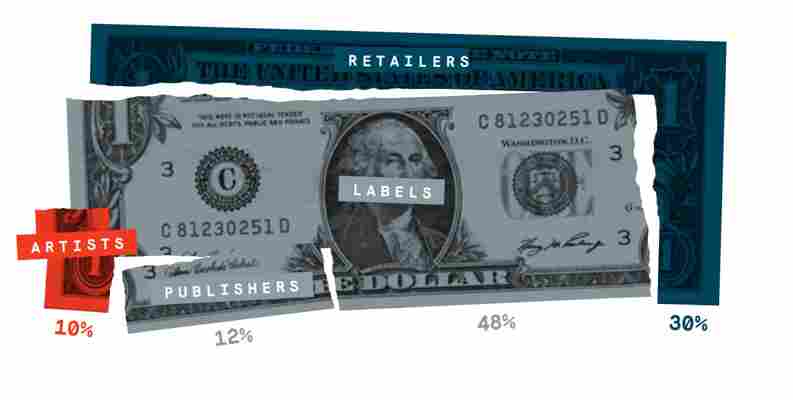Digital music pioneer eMusic recently announced it was pivoting to a blockchain-based royalties management system, ICO and all. The timing of this move looks a bit like a do-or-die situation, but that doesn’t mean it’s a bad idea.

It doesn’t mean it’s a good one either. But if you believe in blockchain, it’s hard to deny that eMusic presents an interesting case for decentralized electronic ledgers. Especially if you break the problem it’s facing down to its most basic form: How do you get money out of consumers’ pockets and into artists’ without screwing either over?
TNW spoke to eMusic CEO Tamir Koch, whose company TriPlay purchased eMusic in October 2015. He describes the situation as dire for artists, he says “the music industry is fundamentally broken.” He’s not the only one who feels this way.
The music industry’s managed to paint itself into a corner. Just a few decades ago consumers were tripping over themselves to pay $15-20 for a short playlist of songs by one artist – we called them albums. Then along came MP3s and it seemed like the only way to combat piracy was to give consumers a smoke-and-mirrors alternative to downloading: Streaming.
It seems like a safe bet to say most of us appreciate streaming music. Who doesn’t love Spotify and Pandora? If you don’t mind advertisements and demand only a modest amount of control over what you listen to they are a dream come true. And if you’re willing to fork over some cash on a monthly basis you can listen to just about anything you want without much fuss. It seems like a good deal, but according to Koch it’s actually not. He says both consumers and digital streaming providers are getting screwed over.
Sony, Warner, and Universal – the big three, as they’re called in music industry parlance – control more than 80 percent of the market in the US. That means they have more sway over the industry than all the other companies participating – thousands – combined. Streaming is good for them, but it’s hurting everyone else.
Take Spotify for example, it loses more money with each new user that signs up for a free account. The company argues that over the long term this will work out, but it’s a strategy that requires cash infusions and faith.
And artists aren’t making money off streaming music either. They’re touring their asses off or making money as influencers, but the royalty checks aren’t exactly setting people up for life.


According to Koch, one reason artists don’t have control over their music — and the royalties they deserve — is a lack of transparency in the industry. Blockchain, he says, can solve this. He says the eMusic token will be 100 percent transparent, so artists will know exactly where every penny a consumer spends, through the platform, goes. The company also intends to integrate a crowdsourcing feature within the token that would allow fans to support artists’ projects before they begin.
It’s not hard to imagine popular artists eschewing the traditional record-advance – which, one way or another, comes out of their end of the profits anyway – in lieu of a Kickstarter-like approach to securing funds for production.
Another innovation Koch says blockchain could bring is a “rent-to-own” system. This would allow consumers to purchase access to albums containing songs they liked on a rental basis. Once a certain threshold was reached (the normal cost to purchase the album), the users would own it outright and make no further payments.
More interesting, perhaps, is an idea eMusic floats wherein an application running on the blockchain would make it possible for users to share listening experiences in real-time. Sure, we can all share playlists, but there’s something cool about knowing we’re listening to the same song as a friend or loved one, at the same time. This used to be called radio, but MTV killed all its stars. It was a whole thing:
Blockchain brings some interesting twists to the music industry, at least as eMusic describes its plans for future implementation. Whether or not an ICO and token are the best way to achieve these ends – ensuring artists get paid, consumers get the tunes they want, and the labels don’t just crush the whole thing – remains to be seen.
The bigger picture is the more compelling one. Koch has only been at the helm for a few years, but his ambition for eMusic seems like the right direction. Even though a pivot to blockchain has become an expected move for cloud-based companies that act as service providers.
But as Koch is quick to point out, eMusic is no ordinary startup. It has decades of experience in a space most people would credit it for helping to create. For more information you can visit the company’s token page here .
Pre-sale of the eMU token begins October 24, with the main sale running from November 1 through April 2019.
Disclaimer: Nothing written in this article is intended to be construed as investment advice.
If you’re interested in everything blockchain, chances are you’ll love Hard Fork Decentralized. Our blockchain and cryptocurrency event is coming up soon – join us to hear from experts about the industry’s future. Ticket sales are now open, check it out!
Elon Musk and Jack Dorsey are right to raise concerns about Web3
The next internet revolution is reportedly upon us , but two of tech’s leading luminaries won’t be in the vanguard.

Tesla tycoon Elon Musk and Twitter founder Jack Dorsey have both put the brakes on the momentum around Web3, the somewhat vague vision of a decentralized internet.
Their cynicism derives from different concerns. Dorsey says that Web3 is ultimately a centralized entity, while Musk has implied that it’s driven by hype over substance.
A bridge to sell you?
Web3 is a nebulous concept with varied definitions — which is one factor spurring the cynicism.
Some advocates envision a democratized internet that harks back to the halcyon days of cyberspace. With blockchain as its backbone, Web3 will give people — rather than corporations — control of data, digital assets, apps, and platforms.
That’s the idea, anyway. Yet critics — including Musk — dispute Web3’s very existence.
In response to a video comparing the early internet with a future iteration, Musk tweeted that Web3 “ seems more marketing buzzword than reality right now.”
He soon aimed another broadside at the concept: “Has anyone seen Web3? I can’t find it.”
Musk’s cynicism has sturdy foundations. Engineers have questioned whether blockchain can provide the spine for a global internet. They point to enormous hurdles around scalability, control, and adoption that must be overcome.
Among the most prominent cynics is S tephen Diehl, a developer and blogger. Like Musk, Diehl distrusts the hype around Web3. He argues that the only problem it needs to solve is how to rationalize its existence:
Who owns Web3?
While Musk questioned the very existence of Web3, Dorsey’s concerns focused on who controls it.
“You don’t own ‘Web3.’ The VCs [venture capitalists] and their LPs [limited partners] do,” he tweeted. “It will never escape their incentives. It’s ultimately a centralized entity with a different label.”
His comments were criticized as stifling the push for a decentralized internet — but the former Twitter CEO wasn’t done yet.
When Musk asked about the whereabouts of Web3, Dorsey provided a withering reply: “It’s somewhere between a and z.”
His response was a reference to a16z , a venture capital firm that’s heavily backed Web3. In response, Chris Dixon, a general partner at a16z, said VCs “actually own very little of it,” but that didn’t allay Dorsey’s concerns about ownership of a future internet.
Dorsey’s not the only person who’s flagged the influence of investors. Diehl has warned that Web3’s being “pushed by the world’s largest investors who have deep bags of tokens to dump .”
These remarks reflect wider concerns around the control of cryptocurrencies. A recent study found that just 0.01% of Bitcoin holders control 27% of the currency in circulation, which has escalated doubts about crypto’s democratizing potential.
Decentralizing the web
Dorsey has been described as part of a tech elite creating the next iteration of the internet, but says he has “nothing to do with ‘Web3’.” He argues that news outlets merely use his name to generate clicks (obviously, we at TNW would never dream of doing such a thing).
Yet his criticism of Web3 doesn’t mean he’s shunning decentralized online services.
On the contrary, Dorsey is an avid supporter of crypto, runs a digital payments company called Block, and backed a project to “develop an open and decentralized standard for social media”.
Musk also has a long — and controversial — history of championing decentralized finance.
Critics may argue that their comments about Web3 are ill-informed or self-motivated, but there are valid reasons to interrogate the hype.
UK mulls banning cryptocurrency assets, says they have ‘no intrinsic value’
As part of a Treasury-led taskforce, the UK’s Financial Conduct Authority (FCA) released details of its investigation into how UK regulators should approach the cryptocurrency industry, mostly by defining the different kinds of cryptocurrencies and their underlying blockchain technology.

Much like the old man who yells at the cloud, the UK government is lashing out at the cryptocurrency industry. Not only does the report reaffirm its view that digital assets (cryptoassets) have no intrinsic value, financial regulators are even considering banning certain kinds.
The report ultimately details the actions the UK government is taking to keep the Crown safe from dodgy cryptocurrency businesses and token-peddling fraudsters, while warning the general public to do their own research before investing.
In the first quarter of 2019, it will have finalized a “consultation” on the potential prohibition of certain types of cryptoassets. In particular, derivatives like contracts for differences, options, and futures could be outright banned next year.
These kinds of investment tools are already being heavily used by US investors on Wall Street.
It is also looking to heavily regulate cryptocurrency services, like wallet providers and exchanges, so expect to see more services with strict know-your-customer and anti money-laundering (KYC/AML) checks like the ones imposed by ShapeShift and Changelly .
“There are substantial potential risks associated with cryptoassets, and the most immediate priorities for the authorities are to mitigate the risks to consumers and market integrity, and prevent the use of cryptoassets for illicit activity,” declares the FCA. “Whilst the Taskforce appreciates that cryptoassets have the potential to bring benefits to markets, firms and consumers, there remains considerable risks that [Treasury], the Bank of England and the FCA will take action to mitigate.”
In fact, the FCA says it will implement one of the most comprehensive global responses to money laundering in order to stamp out illicit Bitcoin activity , promising to go even further than the fifth EU Anti-Money Laundering Directive , first revealed in May.
It is clear the FCA already maintains a certain level of mistrust for the current cryptocurrency platforms on offer, but doesn’t ignore the possibility that they could be proven wrong.
“Cryptoassets have no intrinsic value and investors should therefore be prepared to lose all the value they have put in,” the FCA warns. “There is limited evidence of the current generation of cryptoassets delivering benefits, but this is a rapidly developing market and benefits may arise in the future.”
Still, by the end of this year, the FCA believes it will have clarified which cryptoassets fall within current regulations and whether or not to extend the boundaries to accommodate the blockchain industry.











